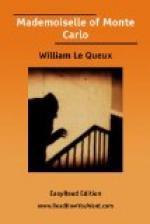It seemed that when The Sparrow protected any criminal the fugitive was safe. He had been sent to Mrs. Mason in Kensington, and he had left her room against The Sparrow’s will.
Hence his peril of arrest. It was that point which he wished to discuss with the great arch-criminal of Europe.
That house was one of mystery. The servant had told him that he was expected. Why? What did The Sparrow suspect?
The whole atmosphere of that old-fashioned place was mysterious and apprehensive. And yet its owner had succeeded in extricating him from that very perilous position at Monte Carlo!
Suddenly, as he stood there, he heard voices again. They were raised in discussion.
One voice he recognized as that of The Sparrow.
“Well, I tell you my view is still the same,” he exclaimed. “What you have told me does not alter it, however much you may ridicule me!”
“Then you know the truth—eh?”
“I really didn’t say so, my dear Howell. But I have my suspicions—strong suspicions.”
“Which you will, in due course, impart to young Henfrey, I suppose?”
“I shall do nothing of the sort,” was The Sparrow’s reply. “The lad is in serious peril. I happen to know that.”
“Then why don’t you warn him at once?”
“That’s my affair!” snapped the gentleman known in Mayfair as Mr. Peters.
“IF Henfrey is here, then I’d like to meet him,” Howell said.
It seemed as though the pair were in a room on the opposite side of the passage, and yet, though Hugh stood at some distance away, he could hear the words quite distinctly. At this he was much surprised. He did not, however, know that in that house in Ellerston Street there had been constructed a curious system of ventilation of the rooms by which a conversation taking place in a distant apartment could be heard in certain other rooms.
The fact was that The Sparrow received a good many queer visitors, and some of their whispered conversations while they awaited him were often full of interest.
The house was, in more than one way, a curiosity. It had a secret exit through a mews at the rear—now converted into a garage—and several other mysterious contrivances which were unsuspected by visitors.
“It would hardly do for him to know what we know, Mr. Peters—eh?” Hugh heard Howell say a moment later. It was the habit of The Sparrow’s accomplices to address their great director—the brain of criminal Europe—by the name under which they inquired for him. The Sparrow had twenty names—one for every city in which he had a cosy pied-a-terre. In Paris, Lisbon, Madrid, Marseilles, Vienna, Hamburg, Budapest, Stockholm and on the Riviera, he was, in all the cities, known by a different name. Yet each was so distinct, and each individuality so well kept up, that he snapped his fingers at the police and pitied them their red tape, ignorance, and lack of initiative.




